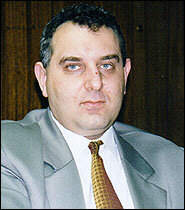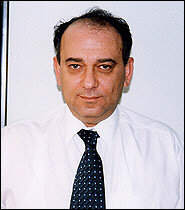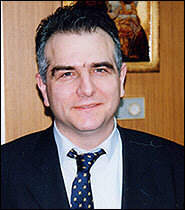 RELATIONS WITH INTERNATIONAL ORGANIZATIONS RELATIONS WITH INTERNATIONAL ORGANIZATIONS |
 THE EBRD: THE BIGGEST INVESTOR AMONG ALL FOREIGN INSTITUTIONS THE EBRD: THE BIGGEST INVESTOR AMONG ALL FOREIGN INSTITUTIONS |

The fact alone that the European Bank for Reconstruction and Development EBRD is the largest foreign investor in Macedonia proves the interest of the international community towards the country.

"Among 24 countries in transition, Macedonia was ranked first by the EBRD due to a successful implementation of its reforms in 2000," Prime Minister Ljubco Georgievski says.
Finance Minister Nikola Gruevski agrees with the Prime Minister's comments, and adds: "EBRD is the largest investor in Macedonia. In their last report, three months ago, there was a chart of 26 countries in transition from Central and Eastern Europe and Macedonia was right on the top, because of the intensity of the reforms in 2000."

But, this support is not taken for granted in Macedonia. Everyone is well aware that the reform process will not proceed that easily; by reform one has to understand privatization. As explains Marjan Bojadziev, Director of Makedonska Banka, privatization is primarily aimed at increasing competition: " For the first time last year, we had foreign investors coming into the banking sector; we are now facing new competition which will probably increase in the future. At the moment, these banks are still restructuring, reorganizing and generating new products, but I believe there will be a tough competition in the next years."
 Its focus Its focus |
As part of its Southeast European Regional Action Plan (SERAP), the EBRD is focusing on:
supporting private sector investment, including large corporations, small and medium-sized enterprises (SMEs) as well as micro-enterprises;
commercial approaches to infrastructure financing, including telecommunications, airports and municipal finance;
improving the institutional capacity of the financial sector. The bank is particularly emphasizing on SME and micro-credit through its network of correspondent banks and specialized micro-lending financial institutions in the region.
Locally, the EBRD has coordinated a number of meetings, including an extremely important one on the power sector. Several transactions are being co-financed by the International Finance Corporation (IFC), the World Bank (IBRD) and the European Investment Bank (EIB).
The participants to these conferences have recognized the unique role of the EBRD among other IFIs in promoting private investment to the region.
 Progress so far Progress so far |
The EBRD is the largest foreign institution having invested in the private sector in Macedonia. The Bank committed up to € 177 million in the country, mobilizing a total investment of nearly € 400 million. In 1999, the new commitments to the country were € 47.4 million, a 69% increase from the previous year. These investments included financing for the expansion of the Macedonian mobile telephone network, the privatization of Stopanska Banka, the expansion of the Alkaloid pharmaceutical plant, the creation of SEAF (the first equity fund in Macedonia), and the extension of trade-guarantee facilities to local banks. The EBRD has also developed a strong pipeline for further projects and expects to exceed its 1999 investment commitments in the year 2000.
EBRD priorities in Macedonia include a greater emphasis on small and medium-sized enterprises, which will form the backbone of the country's continued economic recovery. The Bank supports these smaller businesses through credit lines and equity funds. The EBRD also aims at supporting the financial sector as well as municipal and environmental infrastructure.
 EBRD signed projects in Macedonia EBRD signed projects in Macedonia |
As at 30 June 2000
 Power sub-sector project Power sub-sector project |
In December 1993, the EBRD extended a sovereign-guaranteed loan of DM 46.5 million to Elektrostopanstvo na Makedonija, the national power corporation. DM 38.4 million of this total amount financed the construction of a 113.5 km transmission line between Bitola Thermal Power Station and Skopje, the main industrial center. The balance was allocated to support the Government's Energy Conservation Program.
 Macedonian telecommunications project Macedonian telecommunications project |
A sovereign-guaranteed loan of US$ 42.4 million was signed in March 1995 to modernize the local, long-distance and international telecommunications network. The objective was to connect about 78,000 new subscribers to the fixed telecommunications network, and to provide digital exchanges that give commercial entities access to modern, high-quality services nationally and worldwide. A complementary technical assistance component assisted the Public Enterprise for PTT Traffic, "Makedonija", to develop a corporate strategy and prepare for future privatization.
 Emergency GSM extension and network modernization project Emergency GSM extension and network modernization project |
In October 1999 the EBRD extended a loan of €18.7 million to Makedonski Telekomunikacii, the State-owned company that provides telecommunications, data and mobile phone services. The loan will enable the company to double its mobile GSM network capacity and to modernize the company's information systems. This project is a component of the EBRD South Eastern Europe Action Plan, which aims at facilitating local infrastructure development. This is the first EBRD loan to be extended to a state-owned Macedonian company without a sovereign guarantee. |  Air navigation systems upgrading Air navigation systems upgrading |
In October 1994 the EBRD provided a sovereign-guaranteed loan of US$ 14.1 million to upgrade air navigation equipment and to provide comprehensive air navigation services to commercial aircrafts flying in the country's airspace. The total project cost was US$ 17.4 million, 80 per cent of which was financed by the EBRD. The US Trade and Development Agency provided US$ 250,000 in grants for air traffic controller training and project implementation assistance.
 Skopje Airport upgrading project Skopje Airport upgrading project |
In December 1995 the EBRD extended a sovereign-guaranteed loan of DM 17.8 million for an urgent safety-related upgrade of Skopje Airport, mainly to ensure that safe and efficient air links were maintained within the country. The loan has helped to improve the runway, taxiways and the lighting system so as to optimize the airport's capacity. It is helping the aviation authorities to maintain the improved facilities and to plan for the airport's long-term development. The project preparation was funded by Canadian technical cooperation funds of US$ 230,000, and the US Trade and Development Agency provided US$ 150,000 towards the preparation of the airport development plan.
 Komercijalna Banka A.D. Komercijalna Banka A.D. |

In March 1996 the EBRD extended financing - equity participation and a convertible loan - totalizing DM 15 million to Komercijalna Banka A.D. for on-lending to private sector clients and to assist the bank in upgrading its operations. This includes improving its information technology, management information systems and branch network. As Mr. Hari Kostov, Managing Director of the Komercijalna Banka said, the EBRD is the second largest shareholder in the Bank with about 7%. "What we in Komercijalna Banka appreciate very much is the fact that EBRD has now a permanent seat in the Board of Directors," he said.
 Stopanska Banka (SB) Stopanska Banka (SB) |

SB, the largest bank in the country, has been privatized by the National Bank of Greece (NBG) taking a majority stake in the bank. The EBRD and the International Finance Corporation (IFC) are jointly co-investing with NBG. In December 1999 the Bank and IFC agreed to purchase existing shares and to subscribe to new shares for a total of up to €9.2 million each. This will give the EBRD a stake of up to 10.5 per cent in SB. The capital infusion will permit further asset growth and the implementation of SB's investment program. This includes modernization of its computer systems, branch network upgrading and personnel training. Mr. Gligor Bishev, General Manager of SB, speaks about the changes that took place in the dynamic of the bank with the EBRD shareholding: "This group, together with the National Bank of Greece, has increased our efficiency and facilitated our reorganization (including from an IT perspective) allowing us to have real time balance sheets for the bank as well as for its customers. Their experience has allowed the bank to improve greatly," he said.
 SEAF-Macedonia SEAF-Macedonia |
In July 1999 the EBRD made a US$ 4 million equity investment in SEAF-Macedonia LLC, a US$ 13 million venture capital fund. Follow-on investments range between US$ 400,000 and US$ 1 million. The fund makes equity and quasi-equity investments in small and medium-sized local companies. The Small Enterprise Assistance Fund manages it.
 SME credit lines SME credit lines |
In December 1995 the EBRD extended credit lines to five local banks for medium and long-term financing of private SMEs. The total credit line was DM 40 million, with DM 10 million allocated to Makedonska Banka A.D., DM 15 million to Stopanska Banka A.D., DM 6 million to Almako Banka A.D., DM 6 million to Export-Import Banka A.D, and DM 3 million to Export and Credit Bank. The loan facility is sovereign guaranteed.
 Trade Facilitation Program Trade Facilitation Program |
In January 1999 the EBRD launched a new Trade Facilitation Program (TFP) covering its 26 countries of operations. The trade guarantee facility was extended to three local banks: Stopanska Banka, Komercijalna Banka and Export-Import Banka for a total of €11.7 million. The program facilitates intra- and extra-regional trade by guaranteeing letters of credit in connection with export and import transactions
 Makstil A.D. Makstil A.D. |
In October 1998 the EBRD extended a US$ 15 million loan to assist Makstil, a recently privatized steel producer acquired by Duferco of Switzerland, with its expansion program. The loan is being utilized to modernize Makstil's casting facilities and its Skopje plate mill plant to restore integrated production capacity, thus increasing the plant's overall efficiency.
 Alkaloid A.D. Alkaloid A.D. |
In July 1999 the EBRD extended a loan of €8.7 million to Alkaloid A.D., a locally owned and managed company. The project was financed jointly with IFC, which invested a further €8.7 million. The loan will be used to upgrade, expand and modernize Alkaloid's kopje pharmaceutical plant and to assist the company in meeting "good manufacturing practice" (GMP) standards.
 Export and Credit Bank Export and Credit Bank |
In May 2000 the EBRD made a DM 6 million-equity investment in Export and Credit Bank (ECB), which focuses on lending to small and medium-sized enterprises (SME).
The project will support ECB's growth and will help ECB develop into a strong medium-sized bank. The project will assist the bank in establishing a platform for consolidation and in attracting a strategic investor at a later stage.
"The President of the European Bank for Reconstruction and Development, Ian Limier, is extremely satisfied with its relations with Macedonia. They have invested in Macedonia significant amount of money and organized many projects, in pharmaceutical company Alkaloid, Stopanska Banka, and the pipeline from Thessaloniki to Skopje", the Finance Minister Nikola Gruevski said. |

